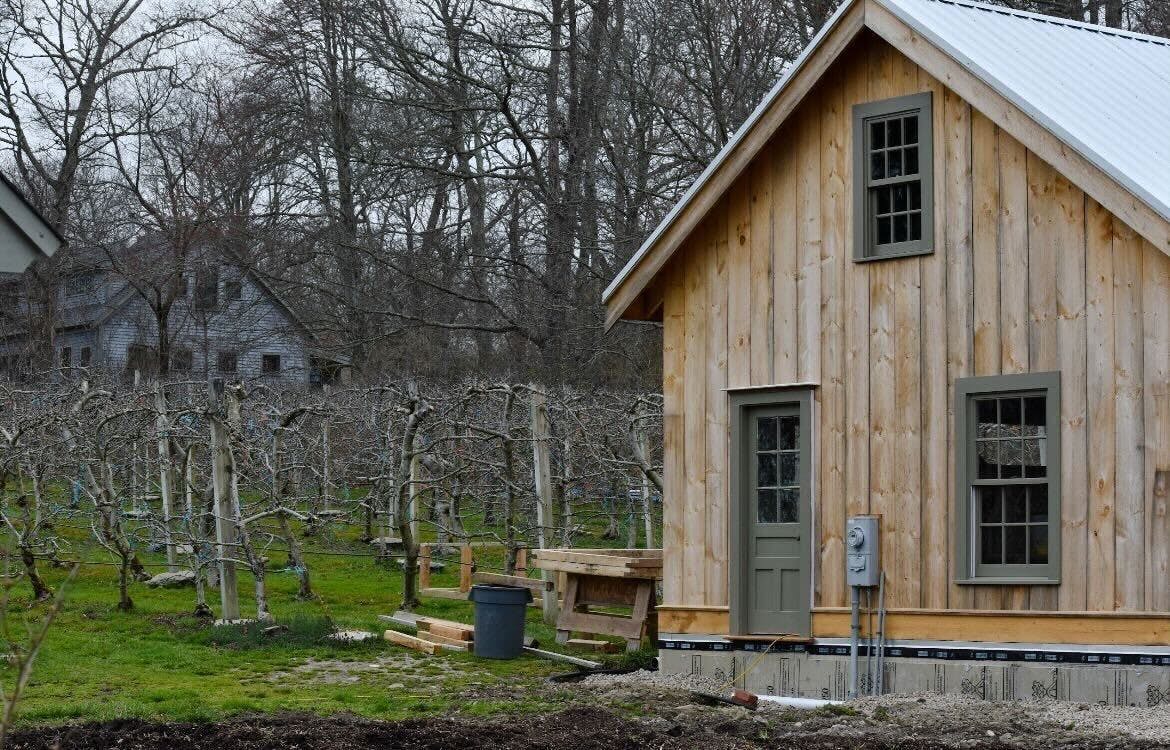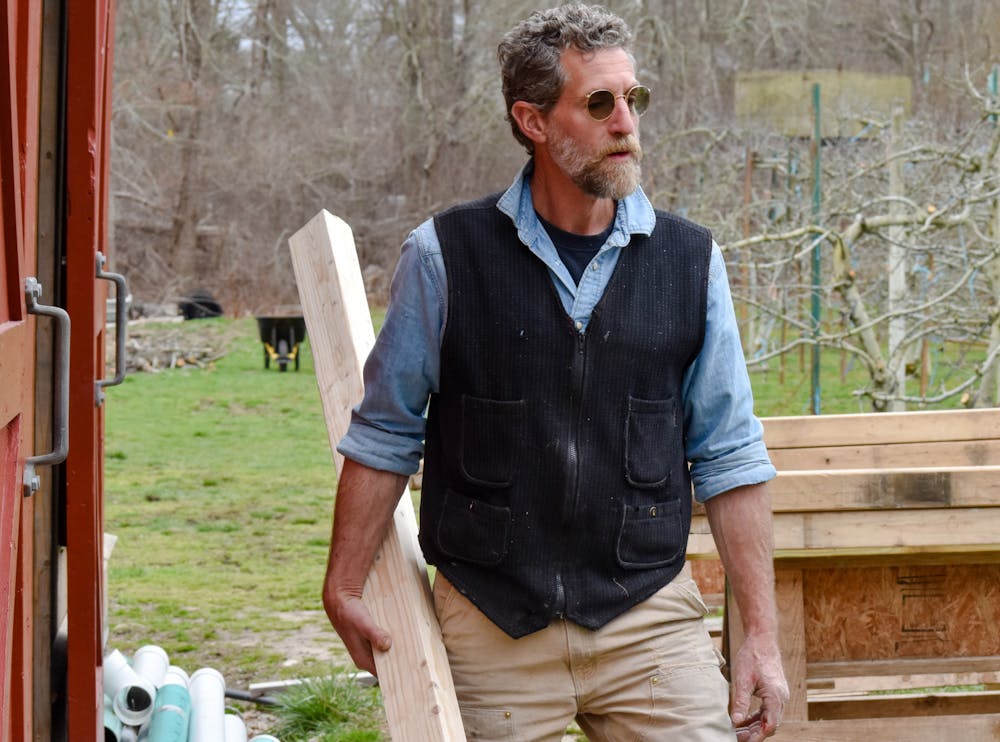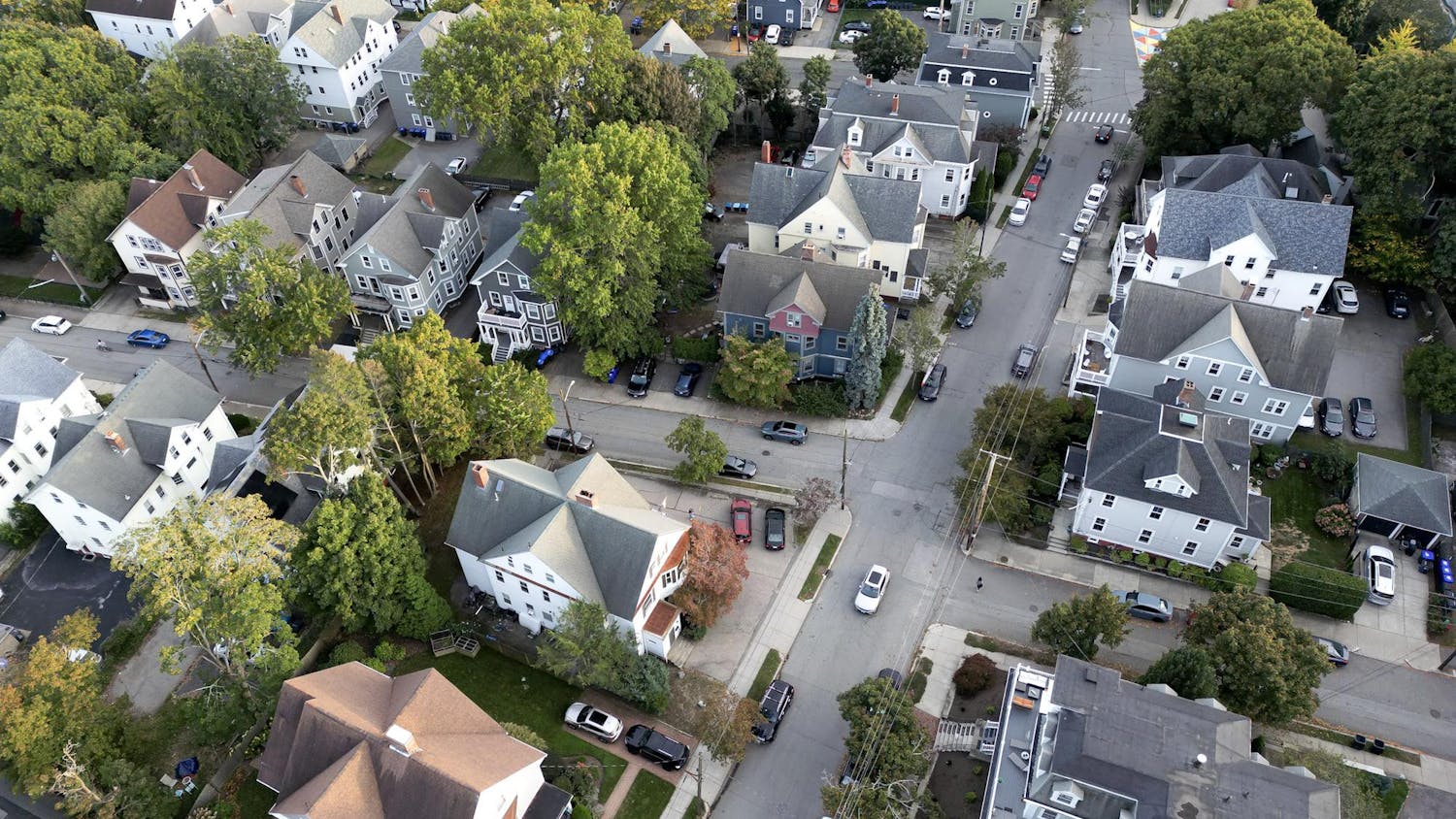In Little Compton, Patrick Bowen is growing 700 apple trees. The goal is to produce organic apples, which Bowen explained can be a challenge. But he is optimistic, hoping to sell fresh apples, eggs and honey inside the barn he is working to convert into a farmers’ market.
Bowen is no stranger to a challenge. As president of the Little Compton Housing Trust — which seeks to "advocate (for) the creation and maintenance of affordable housing," according to Little Compton's website — he has also aimed to grow affordable housing in a small, mostly rural town.
According to data from the Rhode Island State-Wide Multiple Listing Service, the median single-family home in Little Compton sold during April had a price of $1,155,000 — only behind Block Island and Jamestown.
The Rhode Island Housing Fact Book, created by HousingWorks RI, shows a trend of increasing prices in Little Compton: In 2019, the median single-family home price stood at $530,000; by 2021, it jumped to $797,000.
And while state law requires 10% of the housing stock of most Rhode Island municipalities to be affordable, Little Compton falls under the 1% mark with just nine long-term affordable housing units. To meet the state mandate, the town needs to build, convert or adapt more than 150 units, according to the HousingWorks RI 2022 Housing Fact Book.
Little Compton has always struggled with housing affordability, multiple residents told The Herald. But the three years after the onset of the COVID-19 pandemic have exacerbated that reality, shifting the fabric and character of the town.
The town’s commercial character has changed partially as a result of inaccessible housing, Bowen said — noting that the town’s multiple gas stations and bars that were present in his childhood have largely shuttered.
Little Compton residents have taken initiative to expand affordable housing: In 2019, the Housing Trust began working with HousingWorks RI on a survey to determine the need for affordable housing in town. Because of COVID-19, the survey was delayed and came out “on the tail end of the pandemic,” Bowen explained.
Annette Bourne, research and policy director for HousingWorks RI, was impressed by the survey’s high levels of participation, with over 300 responses — a high mark for a small town of just under 3,500.
According to HousingWorks’ final report on Little Compton’s housing needs, respondents not only “note the severity of the housing situation in town, but 43% responded that they or someone they know are struggling with housing.” The report added that most of those interviewed agree that providing affordable housing is the town’s responsibility.

For Bowen, the survey was “energizing” — it sparked interest among residents while allowing for a deeper investigation into the factors contributing to the jump in housing prices.
Alongside the economic impacts of the pandemic and the region’s “agricultural characteristics and coastal constraint,” the report also identified growth in short-term rentals — such as Airbnb and Vrbo — as an extenuating circumstance to Little Compton’s housing situation.
Bourne explained that while Little Compton has always “been at the upper end of pricing in the state,” remote work also made the Little Compton market “much more attractive to people with significant means,” Bourne said.
But while the housing market caters to wealthier demographics, Little Compton has always been defined as a farming community. “We actually have an exhibit called “Everyone was a farmer” because, in the 17th century, everyone in Little Compton was a farmer, both the Sakonnet People and the English settlers,” explained Marjory O'Toole ’89, executive director of the Little Compton Historical Society.
Farming naturally declined through the 19th and 20th centuries.“From that point on, we’ve really just had specialty farms: Christmas tree farms, vineyards, wheat, beef farms, apple orchards and vegetable stands,” O'Toole said.
But now, most workers — agricultural and otherwise — can’t afford to live in town, with low to moderate-income families and younger workers forced to reside elsewhere. As a consequence, Little Compton has an increasingly aging population, Bourne said.
Victoria Talbot, business manager at Jacob Talbot Fine Homebuilding, explained how she has watched the school population shrink while raising her children in Little Compton. “The town has a history of generations staying in town which is a wonderful thing,” she said. “But, unless young people inherit land or a home from their family, it’s very hard for them to get started here.”
“The scariest thing for me, if we don’t address affordable housing, is that we will be a community without children,” said O'Toole. “I can’t imagine living in a community like that.”

Victoria Talbot, business manager at Jacob Talbot Fine Homebuilding and a Little Compton community member, stands outside her office.
“We want to have a real community with people of all ages and all different kinds of backgrounds and socio-economic backgrounds,” Talbot said. “We want teachers to be able to live here, and farmers and fishermen.”
For the past year, Talbot has advocated for affordable housing, facilitating conversations between different citizens’ groups and making information more accessible. “I have been encouraging these different boards and committees, including our Town Council, that we all need to talk about it because it’s complicated,” she said.
Most recently, Talbot has a subcommittee of Little Compton’s Agricultural Conservancy Trust focused on strategy and planning. Established in 1985 by town residents, the Trust aims to preserve “farmland and open space in the face of growing development pressures” by acquiring land and development rights in Little Compton, according to its website.
According to Bourne, preservation has been crucial to addressing environmental constraints and maintaining the town’s identity. But preservation is also on “a collision course with making … more affordable choices in their housing,” she said. The town’s zoning that creates large plots, combined with the fact that the Trust can’t own any properties with dwellings, has limited housing supply and contributed to higher prices in the region.
While preservation efforts have impacted housing prices, Talbot is optimistic about engaging the Trust in affordability efforts. “They really did an excellent job on saving a lot of land,” she said, “but I would suggest that right now that’s not our biggest problem.”
“I’ve written to the Agricultural Trust about the possibility of collaboration,” Bowen said. “And I hold out that that will be the case.” Both Talbot and Bowen want to work with the Trust to increase options for farmers who would like to live in town.
One idea for collaboration: Carving out portions of acquired parcels or parcels donated to the Trust which can “potentially accommodate affordable housing,” Bowen said.
Ned Levine, a trustee and the Agricultural Trust’s Outreach Committee chair, expressed openness to the possibility of collaboration in an email to The Herald.
The LCACT “is open to working on any land conservation project that is within the scope of our enabling legislation and mission,” he wrote. According to Levine, “housing for farmers and seasonal housing for farm workers is an urgent issue in town directly related” to the Trust’s mission and, while the LCACT might not sell land, build, finance or develop housing, they “could participate in a cooperative acquisition.”
“We would welcome cooperation with another organization on acquiring an appropriate parcel of land which could be bought collaboratively; LCACT could acquire a percentage for (agricultural) use and the other organization could acquire a percentage for housing. LCACT would cooperate on land acquisition of a qualified parcel from inception,” he explained.
For O'Toole, engaging the LCACT might help bring young families back into town by “using a portion of that agriculturally conserved land for housing working people.”
“I think we all agree that the town is better when the people who work here also live here,” said Bowen.
Myles Arkins, a new member of the Housing Trust, is most excited about projects that balance preservation and affordability. While Arkins has just recently joined the Housing Trust, his family has sought to tackle affordable housing in town for years. In 2012, Arkins Construction unveiled housing units at 176 Willow Ave which continue to provide more affordable rents to community members.
Arkins, sitting at his desk in Little Compton, gestured to the properties outside his window.
“To make something happen like this in Little Compton you really need to get everyone involved,” he said, noting that it took more than 20 people to make the project a reality.
O'Toole was part of the project, helping write the necessary grants. “I know the people who live there are really happy, but it wasn’t easy,” she said, explaining the challenges of navigating Rhode Island’s bureaucracy as a small municipality.
Arkins is attempting to work at a local level by considering the town’s zoning laws. In Little Compton, he explained, the minimum lot area is two acres. “It’s not that land per acre is expensive, it's that there is a minimum that you can buy,” he said. “You can’t build (an affordable home) if the land is already $150,000 because of the two-acre minimum.”
In rethinking zoning laws, Arkins also highlighted the need to preserve the town’s uniqueness and avoid a “spiraling effect.”
“Little Compton is unique in that the way it makes money is preserving it the way it is now,” Arkins explained.
According to Levine, the LCACT is seeking a grant from the van Beuren Charitable Foundation, which aims to “invest in the quality of life and quality of place of Aquidneck Island and surrounding communities,” according to the foundation’s website.
If awarded, the grant would fund research on the effects of land conservation in Little Compton. The project will investigate “how we can all work together to assure that in the future the town of Little Compton meets the broadest needs of the community while respecting our past and the land uses that make our town special,” Levine wrote.
“I think those will be the coolest projects. If you look at the fabric of the town it’s artisans, fishermen, farmers … and if there’s anything that affordable housing will help is the labor force, whether it’s farming, artisans, builders,” Arkins said.
Beyond a potential collaboration between housing and preservation efforts, the Housing Trust is working to expand its activity in the community. The organization recently purchased a $175,000 property on Colebrook Road that, with more funding, they hope to turn into an affordable unit.
On May 25, Little Compton’s Budget Committee approved the Trust’s $50,000 request to assist with “development costs associated with 184 Colebrook Road,” according to a Committee report.
It is important to consider how the community can better financially support the Housing Trust, Talbot said. “Their annual funding source is not at all robust,” she said. The limited number of building permits granted in the small town are the organization’s main source of funding, alongside state and federal grants. Talbot pointed to a number of potential taxes, such as a tax on vacant homes or short-term rental fees, that could help fund the trust.
“Some of these ideas would require some sort of tax or fee, but mostly they would be on the new incoming development and not on people who live here already,” she explained.
Arkins and Bowen are working together to apply for non-profit status for the Housing Trust, allowing it to receive donations from the community. “We have never been able to have someone donate something to the housing trust and be able to write that off at the federal level, from a tax standpoint, only at the state level,” Bowen said.
“The main goal is to be able to receive donations, create an endowment and just be able to be more agile with what you can do,” Arkins said.
Bowen is optimistic that the non-profit status would expand the Trust’s funding. “I fully expect that the generosity of local people will be realized,” he said.
Little Compton is a “very tight” community, said Talbot.
“I feel so fortunate to be able to live here and raise my kids here and — I’m getting a bit choked up — it’s beautiful,” Talbot said.
For Bowen, communities are at their best when they welcome a diverse group of people. “There is a value to that that is pretty intangible — you can’t put a price tag in that.”
“There’s a lot happening,” said Arkins. “I think everyone wants the same thing, it’s just about how to collaborate and get there.”
When necessary, Talbot ensures, Little Compton shows up.

Julia Vaz was the managing editor of newsroom and vice president on The Herald's 134th Editorial Board. Previously, she covered environment and crime & justice as a Metro editor. A concentrator in political science and modern culture and media, she loves watching Twilight (as a comedy) and casually dropping the fact she is from Brazil.





